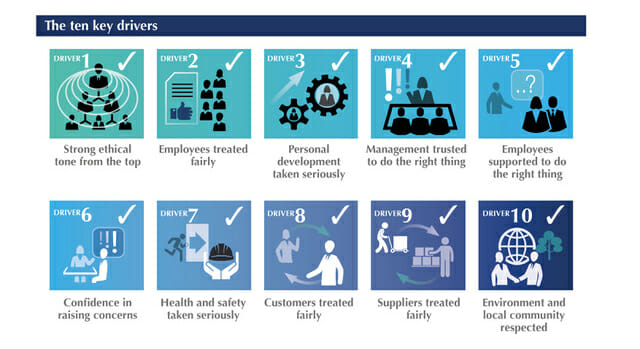Embedding an effective speak-up system
GoodCorporation was invited by EQS Group to lead a webinar on Embedding effective speak-up, part of their “It’s time to speak-up” series. GoodCorporation director, Debbie Ramsay, and senior consultant, Lisa Randles, led the discussion which explored how to create an ethical corporate culture that promotes effective speak-up.
Based on over 20 years of working with companies to assess and embed responsible management practices, GoodCorporation has identified the key drivers that contribute to an ethical corporate culture. From here, we have been able to identify the five key drivers of an effective speak-up culture.


The drivers of an effective speak-up culture
Of the ten key drivers identified above, five are essential to an effective speak-up culture.
- Strong ethical tone from the top: An organisation that is committed to operating ethically will be driven by senior management who set out clear expectations of behaviour. These expectations will be communicated to staff regularly, making it known that any concerns about misconduct will be listened to and dealt with appropriately. Employees who hear her directly from senior leaders that speaking up about wrongdoing are more likely to do so.
- Employees treated fairly: When employees are treated fairly, they are more likely to trust in senior management and therefore feel confident in raising concerns should they become aware of any misconduct. Speaking out can be difficult and takes courage, so staff need to feel sure they will be listened to and treated properly if they speak out.
- Management trusted to do the right thing: This core tenet of an ethical company culture is critical to a speak-up environment. All stakeholders, particularly employees, must have confidence that senior management will act appropriately when concerns are raised.
- Employees supported to do the right thing: Establishing a supportive culture will create a safe environment that encourages staff to speak up. This ranges from encouraging staff to share their views about how systems and ways of working can be improved, to ensuring that staff are trained both in raising concerns and correctly handling those that are raised. When it comes to speak-up, this also means providing multiple channels for raising concerns, giving staff the opportunity to report in a way that feels comfortable.
- Ensuring confidence in raising concerns: Senior managers are vital when it comes to instilling confidence in using a speak-up system. This means regularly communicating to staff that their the company operates and open-door policy and wishes to hear of concerns about misconduct. Senior leaders will use multiple opportunities to promote the speak-up system, share whistleblowing policies and emphasise confidentiality and non retaliation.
Speak-up and culture go hand in hand. Without a strong ethical workplace culture to build on, organisations will struggle to successfully embed their speak-up systems. However those organisations that can successfully implement an open-door culture that promotes speak-up will strengthen the relationship and trust between management and staff. This will lead to greater motivation for staff, who feel valued and listened to, increased productivity and enhanced risk management, as leaders will also feel confident they will be alerted to a problem before it becomes a crisis.
To read more about the essential pillars of effective speak-up, read our blog on the Integrity Line Experts Corner
GoodCorporation works with companies to test and strengthen their whistleblowing procedures using our Whistleblowing Framework as the basis for these assessments.
